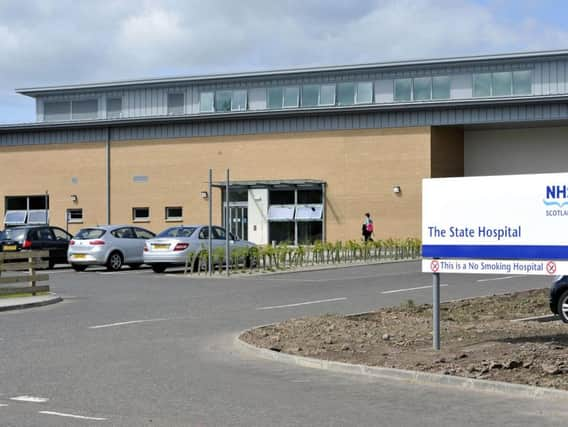Scotland's most dangerous psychiatric patients given an animal farm to help calm them


The 124 birds and animals cared for at the State Hospital at Carstairs, Lanarkshire, include hens, goldfish, two goats, called Alec and Davy, a rabbit named Flop, and Wee Jon the guinea pig.
Doctors believe the menagerie helps improve the mental health of Scotland's most dangerous psychiatric patients.
Advertisement
Hide AdAdvertisement
Hide AdThe animal-assisted therapy section at the rebuilt £60 million hospital is popular with patients.
One of Scotland's leading psychiatric experts said contact with animals has shown significant benefits seriously ill patients.
Animals have been kept at the hospital for many years but an upgraded facility was built next to Carstairs' Skye activities centre when the revamped hospital opened in 2012.
It currently houses a pair each of pigs, goats, rabbits and guinea pigs as well as a turkey called Kensi, ducklings named Peanut, Laurie and Iona, 15 ducks, 40 chickens, 25 aviary birds and 30 goldfish.
Consultant forensic psychiatrist Professor John Crichton, chairman of the Royal College of Psychiatrists in Scotland, and a former medical director at the State Hospital, said: "Patients may have complex histories of trauma or difficulty relating to other people.
"Contact with an animal can help patients connect in a way that talking or other activities can fail to do."
A previous report by the hospital on the facility stated: "Jimmy is a patient who paces the floor continually on the ward.
"He responds to auditory hallucinations, visibly gesturing and audibly engaging in dialogue. On one occasion he was asked, will you go into the animal cage and feed them?'
Advertisement
Hide AdAdvertisement
Hide Ad"The response was unexpectedly positive and he entered the cage. The animals appeared a diversion from his symptoms and he asks frequently if they are faring well."
Another staff report noted: "During a weekly visit with rabbits or guinea pigs to one ward, we noticed a patient with a violent history was consistently calm around the animals and would hold them gently and talk to them.
"This patient had attacked staff and other patients, and damaged furniture on an almost daily basis. We made a comparison of the number of incidents initiated by the patient over a six-month period.
READ MORE -
"There was a reduction from 24 to 10 in the periods before and after the guinea pigs were kept."
The Lanarkshire hospital, home to just over 100 patients referred by the courts, prisons or other hospitals, houses the most dangerous and severely ill psychiatric patients from Scotland and Northern Ireland.
Animal assisted therapy in the UK began by accident in 1989 after blind patient was admitted to an unnamed hospital accompanied by his guide dog.
Staff reported the atmosphere in the ward changed and the dog became a focus of attention and seemed to relieve the pressures felt by staff and patients on a busy ward.
It led to regular visits by dogs and guinea pigs being arranged.
Advertisement
Hide AdAdvertisement
Hide AdA State Hospital spokeswoman said: "The Animal Assisted Therapy Centre is an established therapeutic activity area for our patients and sits alongside other treatment interventions.
"It has been extended, as a result of the evidence of the benefits to patients, and now includes some farm animals.
"All of the activities in the department are implemented using the skills of our staff."